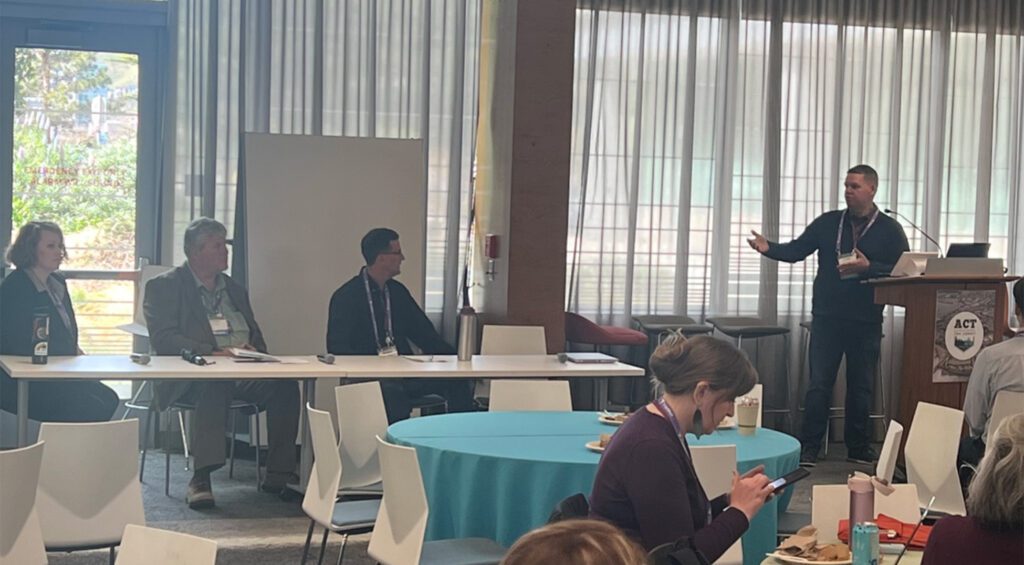Summary
At the Association for Commuter Transportation's West Coast Regional TDM Summit, experts from Google, Genentech, Pacific Gas & Electric Company, and Hallcon came together to discuss evolving trends, challenges, and opportunities within the electrification and alternative fuels industry.
The future of transportation is brighter than ever as we continue to learn about the importance of fleet electrification. While the journey to a zero-emission program can be both challenging and complex, many of the largest hurdles can be cleared by drawing insights from the experiences of those who have paved the way before us.
At the Association for Commuter Transportation’s West Coast Regional TDM Summit, experts from Google, Genentech, Pacific Gas & Electric Company, and Hallcon came together to discuss evolving trends, challenges, and opportunities within the electrification and alternative fuels industry.
Sustainability climbs higher on corporate agendas with each passing year, yet it can seem like uncharted waters to many. As sustainability remains top of mind, insights and guidance from industry thought leaders can serve as critical components for any organization researching or navigating the world of electrified transport. Transitioning a fleet can present major roadblocks: energy requirements, infrastructure constraints, advancements in battery technology, and system integration, to name a few.
The panel, moderated by Hallcon’s Senior Director of EV Infrastructure, Lloyd Ickes, addressed many of these challenges. With an extensive background in electric vehicles and a deep understanding of the dynamics involved in transitioning to sustainable transport infrastructure, Lloyd emphasized real-world applications and the obstacles many companies might face on the path to electrification.
“As we transition our fleets to electric or alternative fuel sources, we face new challenges, such as energy demand, infrastructure limitations, battery technology, and integration, which all of us must address. To help us prepare for this transition, we must use collaboration’s power to achieve sustainable progress,” Lloyd Ickes stated during the panel.
Here are the five pivotal takeaways from the panel discussion, each serving as lighthouse for those setting sail on the high seas of fleet electrification.
1. Know Your Goals
Understanding the destination is just as important as understanding the road map to launch EV initiatives. It is vital to recognize the specifics of your electric fleet’s composition needs so that you can meet corporate and emissions targets. This vision is critical not just for vehicle purchases, but also for charging infrastructure installations.
2. Future-Proof Your Technology
In the ever-changing worlds of technology and environmental standards, future-proofing is a matter of strategic intelligence. This involves developing the foresight to implement systems and solutions capable of adapting to the unpredictable technological landscape, all while remaining compliant with evolving regulations.
3. Find the Right Site
Location, location, location—a mantra not just for real estate, but for the placement of your EV infrastructure. Ensuring that charging infrastructure are in ideal locations for your operations, power needs, and the scalability of your program are all essential ingredients in the recipe for success.
4. Engage With Your Utilities Early
Conversations with utility companies, early and often, are imperative to assess and meet the energy demands of fleets of EVs. This liaison is a bridge between the transportation domain and the power supply industry. By including local utilities early in the electrification process, your organization can avoid late-stage headaches and catastrophic misalignments.
5. Read the Fine Print
Securing grants for implementing EV programs may seem like an enormous leap forward, however, every program has unique constraints that must be understood. Often, “strings attached” compels a reexamination of the supposed benefits. Understanding the federal, state, and local-level grant landscape is vital to avoiding unintended compliance burdens.
Overall, the panel recommended opening lines of communication that can serve as an organizational compass, steering you away from common pitfalls and towards a sustainable, electric future that is as practical as it is visionary. For transportation leaders and organizations, these touch points are often the difference between merely joining the EV movement and truly leading it forward.
The Charged Horizons: The Future with Electrification and Low Carbon Fuels panel took place on Thursday, April 4, 2024, during the Association for Commuter Transportation’s (ACT) West Coast Regional TDM Summit. For more information about the summit and to view the complete agenda, please visit the ACT West Coast Regional TDM Summit Agenda.
About Hallcon
Hallcon is the premier transportation partner in designing, developing, and operating critical Electric Vehicle (EV) infrastructure and sustainable fleet technologies. We deliver unparalleled expertise in turnkey infrastructure development, change management, EV operations, and EV infrastructure maintenance.
